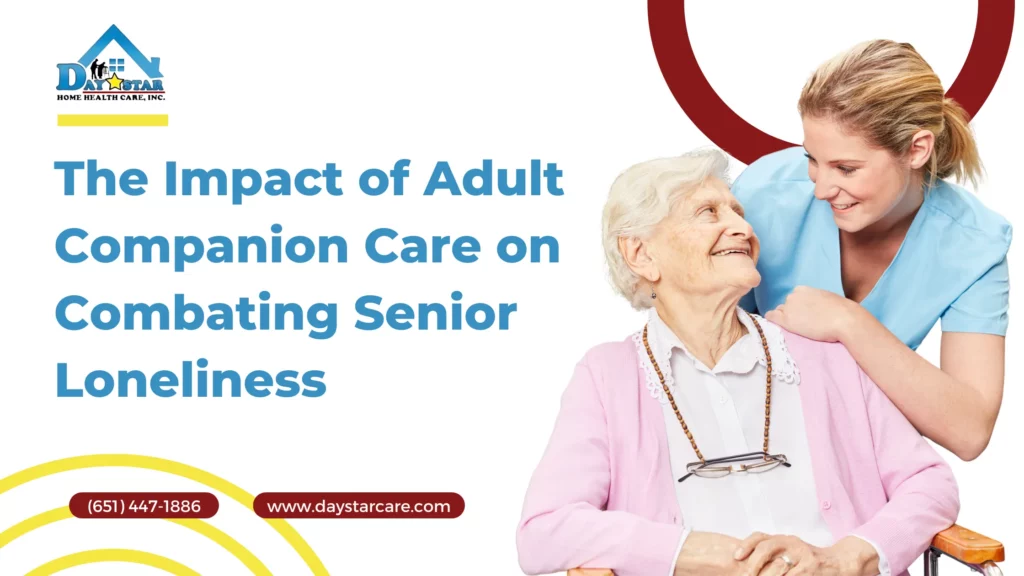- 651-447-1886
- [email protected]
- 24 Hour In-home Care

The Impact of Adult Companion Care on Combating Senior Loneliness
- December 12, 2023
Loneliness is a growing epidemic among seniors, with far-reaching consequences for both mental and physical health. As we age, our social networks often shrink due to factors like retirement, mobility issues, and the loss of loved ones. This social isolation can lead to feelings of loneliness, depression, and a diminished sense of purpose. However, there is a powerful tool in combating senior loneliness: adult companion care. At Daystar Care, we’ve seen firsthand the transformative impact that companion care can have on the lives of seniors in the Twin Cities area.
The Prevalence and Impact of Senior Loneliness
Before we dive into the role of companion care, it’s important to understand the scope and severity of the senior loneliness problem. Studies have found that over 40% of seniors regularly experience loneliness, and this number is only expected to grow as the population ages.
The consequences of chronic loneliness are stark. Lonely seniors are at higher risk for a range of health problems, including:
- Depression and anxiety
- Cognitive decline and dementia
- Heart disease and stroke
- Weakened immune system
- Increased risk of premature death
In fact, some research suggests that the health impact of loneliness may be comparable to smoking 15 cigarettes a day.
But the impact of loneliness goes beyond physical health. Lonely seniors often experience a decreased sense of purpose and self-worth, leading to a lower quality of life. They may withdraw from social activities and lose interest in hobbies and passions, further exacerbating their isolation.
How Adult Companion Care Can Help
Adult companion care is a service designed to provide seniors with the social interaction, emotional support, and companionship they need to combat loneliness and maintain a high quality of life. Companion caregivers are trained professionals who visit seniors in their homes, providing conversation, engagement, and assistance with daily activities.
The impact of this simple intervention can be profound. Here are just a few of the ways that adult companion care can help combat senior loneliness:
1. Providing Regular Social Interaction
One of the primary roles of a companion caregiver is to provide consistent, meaningful social interaction. They engage seniors in conversation, share stories and experiences, and provide a friendly, listening ear. For seniors who may go days or even weeks without substantive human contact, this regular interaction can be life-changing.
2. Encouraging Engagement in Activities
Companion caregivers also encourage and facilitate seniors’ engagement in activities and hobbies. They might play games, work on puzzles, or assist with crafts or projects. They can also accompany seniors on outings, such as walks in the park or trips to the library. By helping seniors stay active and engaged, companion caregivers combat the apathy and withdrawal that often accompany loneliness.
3. Providing Emotional Support
Loneliness can take a significant emotional toll, and companion caregivers are there to provide the support and understanding seniors need. They offer a comforting presence, a sympathetic ear, and the reassurance that someone cares. This emotional support can be particularly valuable for seniors who are grieving, dealing with health challenges, or facing other difficult life transitions.
4. Facilitating Connection with Loved Ones
While companion caregivers provide crucial social interaction themselves, they also help seniors stay connected with their loved ones. They can assist with phone calls, video chats, or letter writing, ensuring that seniors can maintain these important relationships even if distance or mobility issues are a barrier.
5. Monitoring for Signs of Decline
Because companion caregivers spend significant one-on-one time with seniors, they are well-positioned to notice any changes in mood, behavior, or cognitive function that may signal a need for additional support. They can communicate these observations to family members and healthcare providers, helping to ensure that seniors receive the care they need.
The Daystar Care Difference
At Daystar Care, we understand the critical role that companion care plays in senior well-being. That’s why we’re committed to providing the highest quality companion care services to seniors in the Twin Cities area.
Our companion caregivers are carefully selected for their compassion, patience, and ability to form genuine, caring relationships. We match each senior with a caregiver who is compatible with their personality, interests, and needs, fostering connections that are authentic and meaningful.
In addition to providing regular companionship visits, our caregivers are also trained to assist with a variety of daily activities, such as light housekeeping, meal preparation, and medication reminders. This comprehensive approach ensures that seniors receive the practical support they need to live comfortably and independently.
We also work closely with seniors’ families, providing regular updates and opportunities for involvement in the care process. We understand that combating loneliness is a team effort, and we’re committed to being a partner and resource for families every step of the way.
The Power of Connection
At Daystar Care, we’ve seen the power of connection in action. We’ve seen lonely, withdrawn seniors blossom with the regular companionship and support of our caregivers. We’ve seen families find peace of mind, knowing that their loved one has a caring, consistent presence in their life.
If you or a senior loved one in the Twin Cities area is struggling with loneliness, we invite you to contact Daystar Care. Our knowledgeable, compassionate team is ready to listen to your needs, answer your questions, and develop a personalized care plan that promotes connection, engagement, and joy.
With Daystar Care’s adult companion care services, you can take the first step towards a more fulfilling, connected life. Let us help you combat loneliness and rediscover the power of human connection.

